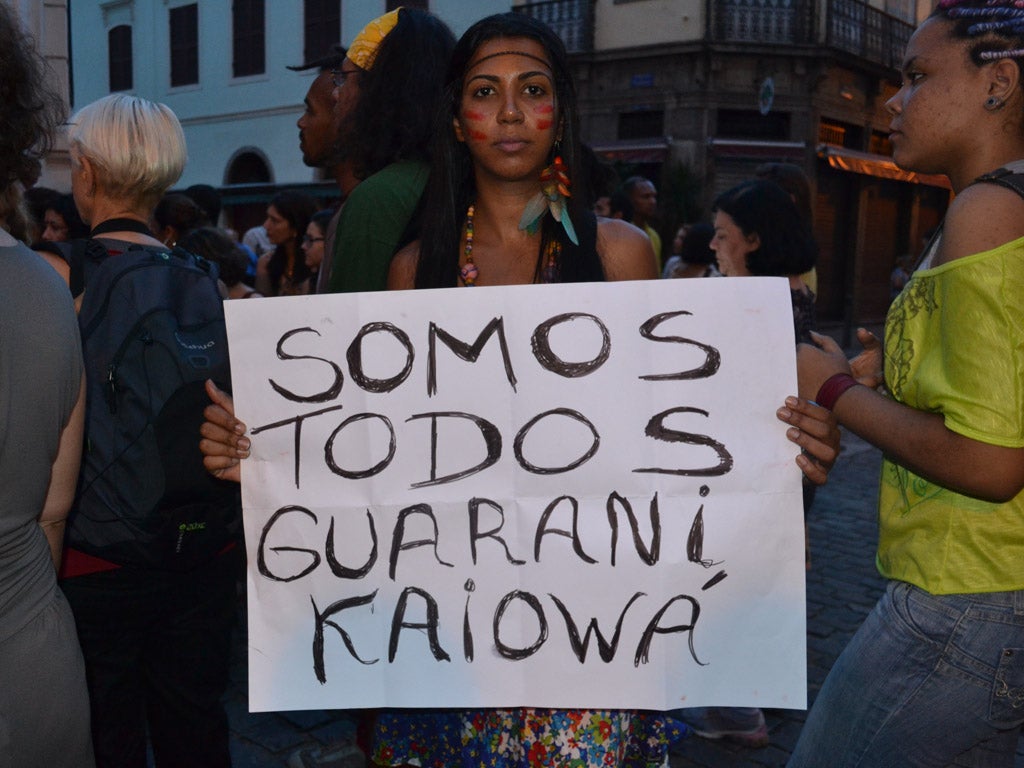The terrifying threat of collective suicide if the government takes the land of an Indian tribe
An Indian tribe have informed the Brazilian government they will commit suicide if they are forced from their homes.

Your support helps us to tell the story
From reproductive rights to climate change to Big Tech, The Independent is on the ground when the story is developing. Whether it's investigating the financials of Elon Musk's pro-Trump PAC or producing our latest documentary, 'The A Word', which shines a light on the American women fighting for reproductive rights, we know how important it is to parse out the facts from the messaging.
At such a critical moment in US history, we need reporters on the ground. Your donation allows us to keep sending journalists to speak to both sides of the story.
The Independent is trusted by Americans across the entire political spectrum. And unlike many other quality news outlets, we choose not to lock Americans out of our reporting and analysis with paywalls. We believe quality journalism should be available to everyone, paid for by those who can afford it.
Your support makes all the difference.In a letter to the government 50 men, 50 women and 70 children have promised to kill themselves if they are removed from their sacred land of Cambará Farm, where they live by the Hovy River in Mato Grosso do Sul.
Despite the Indian Statute written within Brazilian law, the clashes between authorities and the indian tribes are constant. This time, after years of warning the authorities that they were living by the river and that they needed it to be recognized legally, the indians are threatening to kill themselves after it was announced they will be removed from their land.
"The Guarani-Kaiowá are being culturally and politically assassinated. Be it by lack of help from the government, be it by gunmen bought by farmers," reads the letter. "We have lost hope of a dignified survival without violence in our sacred land, we no longer believe in the Brazilian justice system"
The issue is more complicated than it seems. As Brazilians, we can all assume we have a little bit of Guarani-Kaiowá blood in all of us. And if we don't, the cultural ties are strongly weaved between all of us. We all know a little bit about the indians, the original Brazilians, and what the Portuguese did to them. Can we really accept that Brazilian authorities could do the same?
Sure we can. Between 2003 and 2011, according to the Indigenous Missionary Council (Cimi), 503 indians were murdered in the whole of Brazil. From these, 279 were Guarani-Kaiowá. They're in danger, for they occupy large pieces of land that could be used for many other things that would actually bring profit to the country. As the government hasn't made the land ownership of most tribes legal, people invade their land to steal it. It's almost as if colonialism hadn't been proven to have a terrible outcome.
Another big issue for the tribes is suicide; 26 indians took their own lives in 2011, according to Cimi. Although the organization gives no specific reason for so many suicides, I think we can safely assume it also has something to do with the stealing of their lands and the constant struggle with the modern world.
When a letter declares that 70 children will kill themselves, it's hard to imagine so many children actually took that decision upon themselves. Of course, it's a desperate threat, acting to shock so that they will get their land back. But has it really reached the point where these tribes find it necessary to hold their own children hostage? The authorities are definitely the "bad guys" in this situation, but shouldn't we also be outraged that this tribe is essentially threatening to terminate the lives of so many young girls and boys?
It must not be forgotten that even though the taking away of the land is being done by the authorities, the threats of death are being made by the tribe. And that is unforgivable, no matter how much they think their land is worth to them. Every day, teenage suicides are reported in the media and people are saddened and enraged by a world that makes such a young person take their own lives. And even though their cause is a worthy one, it will never be worth the lives of 70 children.
By now, authorities have declared the collective suicide is nothing but a rumour. But a protest in the centre of Rio de Janeiro this weekend suggests that the possibility of deaths is still a very bitter reality, be it by suicide or by murder.
Join our commenting forum
Join thought-provoking conversations, follow other Independent readers and see their replies
Comments